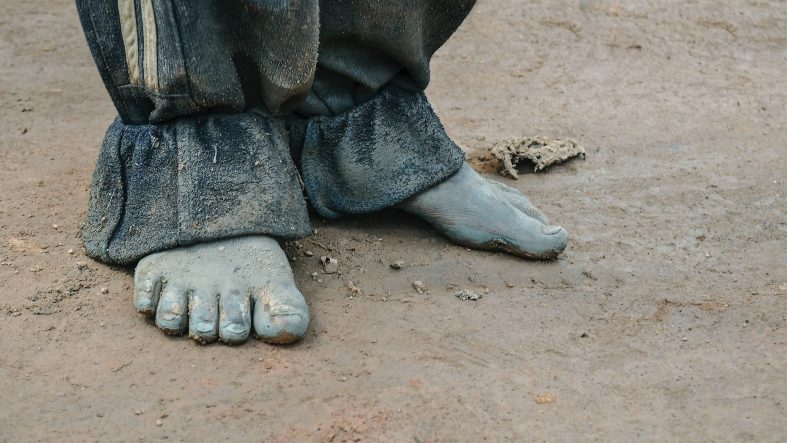Today is part 3 of a series on the first Beatitude from Matthew 5:3 – “Blessed are the poor in spirit, for theirs is the kingdom of heaven.” Monday covered how the statement could make both the “proud” and the “ashamed” humble and be blessed by God. Tuesday was about the rich young man who was fully set on earning his own salvation to see that it was impossible, all while Christ was right before him, loving him and offering him salvation by grace.
Today begins with Luke 18:10-14 –
“Two men went up into the temple to pray, one a Pharisee and the other a tax collector. The Pharisee, standing by himself, prayed thus: ‘God, I thank you that I am not like other men, extortioners, unjust, adulterers, or even like this tax collector. I fast twice a week; I give tithes of all that I get.’ But the tax collector, standing far off, would not even lift up his eyes to heaven, but beat his breast, saying, ‘God, be merciful to me, a sinner!’ I tell you, this man went down to his house justified, rather than the other. For everyone who exalts himself will be humbled, but the one who humbles himself will be exalted.”
Similar to Monday’s post, this passage is a rebuke to the proud, while comforting the ashamed, which is made clear at the end of these verses. This passage also plays on stereotypes of the Pharisee as one who would have been perceived as religiously superior, versus the tax collector, who was under the ban, or that time period’s rabbinic version of excommunication[1]. At the end of the first sentence, the audience would have been expecting the Pharisee to pray well – after all, they were the “experts.” But as an “expert” in the law, the Pharisee prays (and thinks) in terms of lists of good things and lists of bad things. As a result, he is able to credit himself with all good things and the tax collector with all bad things because his lists aren’t complete.
The Pharisee manages this level of pride in spiritual accomplishment by narrowing down his list of sins to “things that other people do.” He also excluded more subtle or internal manifestations of sin from his lists. For example, at other times, Jesus said Pharisees “devour widow’s houses,”[2] which may have been a form of extortion. Also, in his heart he may have been unjust and an adulterer just by making this prayer – judging the tax collector and misrepresenting God. God’s justice on the tax collector was poured out on Jesus – who was this Pharisee to say who that justice applied to? Also, in over-emphasizing the law, the Pharisee was “cheating” on God by idolizing the law as a way to salvation.
By narrowing the list of sins to “what others do,” and reducing those sins to the external evidence of them, rather than the heart level, this Pharisee blinded himself to his own need, and therefore missed the blessing of the Beatitude. The only way to feel rich in spirit before God is to lower the standard, or to humbly accept Christ’s righteousness – the riches of His spirit – in place of your own.
In Psalm 51, King David wrote of his repentance after committing adultery with Bathsheba and having her husband Uriah killed in verses 16-17:
“For you will not delight in sacrifice, or I would give it;
you will not be pleased with a burnt offering.
The sacrifices of God are a broken spirit;
a broken and contrite heart, O God, you will not despise.”
This broken spirit and contrite heart recall the first Beatitude’s promise of blessing and the ability to follow God’s will, which David prayed for back in verse 12 of Psalm 51:
“Restore to me the joy of your salvation,
and uphold me with a willing spirit.”
We can’t constantly compare our record of our sins with our record of the sins of others if we want to receive God’s blessing. Our records are always incomplete and biased. Doing so is only likely to destroy our ability to love those who God loves and to whom He offers His grace, including ourselves. We are poor in spirit, but we only realize it when focusing on Him, and we only are blessed when we decide His standard and opinion are the ones that matter. If we are Christians, the standard is Christ and through our adoption as children of God, He sees Christ’s righteousness when He gives His opinion of us.
Humbly knowing this, we can go to our house justified, and in eternity be exalted by Him, the only one we should compare ourselves to and the only one whose judgement matters. For now, this humility enables us to love God and love others as we love ourselves.
To find joy, give up your lists of sins and replace them with Christ.
“Blessed are the poor in spirit, for theirs is the kingdom of heaven.” – Matthew 5:3
[1] See an earlier post, Found! A Man in Need of an Ally, for an explanation of the ban as applied to tax collectors, and for Jesus’ striking decision to forgive Zacchaeus, a chief tax collector.
[2] Mark 12:40; Luke 20:47





